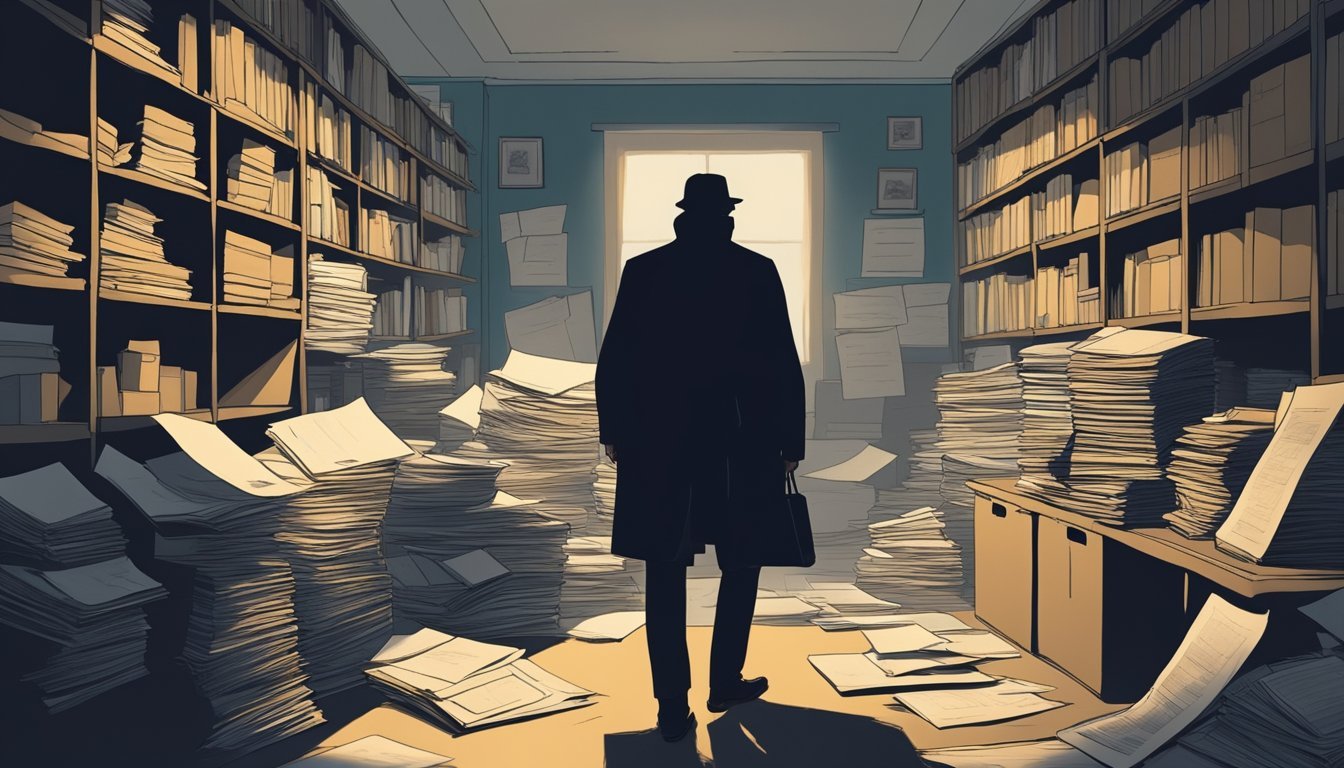Examining the Pacing and Structure of "The Night Agent": A Taut Political Thriller Analysis
"The Night Agent" captivates viewers with its fast-paced narrative and intricate plot structure. Based on Matthew Quirk's novel, this action-thriller series weaves together elements of suspense, political intrigue, and high-stakes espionage. The show's expertly crafted pacing keeps audiences on the edge of their seats, balancing intense action sequences with character development and plot revelations.
The series follows FBI agent Peter Sutherland as he navigates a complex web of conspiracies and danger. Each episode builds upon the last, creating a sense of urgency that propels the story forward. The structure of "The Night Agent" allows for multiple storylines to unfold simultaneously, keeping viewers engaged and guessing until the very end.
With its blend of thrilling action and carefully plotted suspense, "The Night Agent" exemplifies the best aspects of the thriller genre. The show's creators have crafted a narrative that maintains tension throughout, using cliffhangers and plot twists to keep audiences invested in the characters' fates. This masterful approach to pacing and structure has contributed to the series' success and its renewal for future seasons.
Author Background and Publication
Matthew Quirk, a journalist-turned-novelist, penned "The Night Agent" which was published on January 15, 2019. The book garnered attention for its fast-paced political thriller storyline and Quirk's background in reporting.
Matthew Quirk: A Profile
Matthew Quirk began his career as a journalist for The Atlantic, covering crime and terrorism. This experience provided him with valuable insights into the world of politics and espionage. Quirk transitioned to fiction writing, leveraging his investigative background to craft compelling thrillers.
His work on "The Night Agent" showcases his ability to weave complex political narratives with intense action sequences. Quirk's journalistic eye for detail is evident in the novel's portrayal of Washington D.C. and its power dynamics.
Publication History and Reception
William Morrow, an imprint of HarperCollins, published "The Night Agent" on January 15, 2019. The novel quickly gained traction among thriller enthusiasts and critics alike. Book reviews praised Quirk's pacing and intricate plot development.
"The Night Agent" received positive reception for its timely themes and relentless suspense. Critics noted the novel's similarities to popular TV series like "24" in terms of pacing and tone. The book's success led to its adaptation into a Netflix series, further expanding its audience reach.
Plot Overview
"The Night Agent" follows FBI agent Peter Sutherland as he uncovers a vast conspiracy reaching the highest levels of government. The series blends high-stakes action with political intrigue, centering on an emergency phone line in the White House Situation Room.
Introduction to Characters
Peter Sutherland is a dedicated FBI agent working the night shift at the White House. His role as a "night agent" involves manning an emergency line that rarely rings.
Rose Larkin, a young tech CEO, becomes entangled in the plot after her aunt and uncle are attacked. She seeks help through the emergency line Peter monitors.
Other key players include high-ranking government officials and covert operatives, whose loyalties are constantly questioned throughout the series.
Premise and Setting
The story primarily unfolds in Washington D.C., with the White House serving as a central location. Peter's assignment to the Situation Room's emergency line sets the stage for the unfolding mystery.
The premise revolves around a dormant phone that suddenly becomes active, pulling Peter and Rose into a dangerous web of political conspiracies and assassination attempts.
Major Plot Points
A bombing on the D.C. Metro kickstarts the series, leading to Peter's involvement in the investigation.
Rose's call to the emergency line after her relatives' attack connects her with Peter, forming an unlikely alliance.
Peter and Rose uncover evidence of a mole within the government, sparking a hunt for the traitor.
The conspiracy expands to involve attempts on the President's life and plans for a coup.
Peter races against time to expose the conspirators and prevent the overthrow of the government, culminating in intense confrontations and shocking revelations.
Themes and Motifs
"The Night Agent" weaves together several compelling themes that drive its narrative and character development. These elements create a tense atmosphere and explore complex moral dilemmas.
Trust and Betrayal
Trust forms the foundation of relationships in "The Night Agent," yet it's constantly tested. FBI agent Peter Sutherland must navigate a web of deceit, unsure who to rely on. His growing bond with Rose Larkin is juxtaposed against potential betrayals from colleagues and superiors.
Loyalty to country clashes with personal relationships. Characters face difficult choices between duty and protecting loved ones. This tension keeps viewers guessing about characters' true motivations.
The series examines how betrayal can come from unexpected sources. It shows the emotional toll of constantly doubting others' intentions.
Tension and Danger
"The Night Agent" maintains a high level of suspense through ever-present threats. Peter's role as a night action coordinator puts him in constant peril. Unexpected phone calls and clandestine meetings create an atmosphere of unease.
Action sequences punctuate quieter moments of investigation. Car chases, shootouts, and narrow escapes keep the adrenaline flowing. The series balances these thrills with tense conversations and subtle power plays.
The danger extends beyond physical threats. Characters risk their careers, reputations, and freedom in pursuit of the truth. This multi-faceted approach to peril adds depth to the narrative.
Conspiracy and National Security
A complex conspiracy lies at the heart of "The Night Agent." The series explores how far-reaching plots can threaten the foundations of government. It delves into the murky world of political machinations and hidden agendas.
National security becomes a central concern as the conspiracy unfolds. The show examines the lengths agencies will go to protect classified information. It questions whether extreme measures are justified in the name of national defense.
The series presents a nuanced view of patriotism. Characters grapple with conflicting loyalties to country, agency, and personal moral codes.
Secrecy and Surveillance
"The Night Agent" highlights the pervasive nature of modern surveillance. Characters use advanced technology to track suspects and uncover hidden truths. The series showcases both the power and potential for abuse of these tools.
Government secrecy plays a major role in the plot. Classified information becomes both a weapon and a shield. The show explores how compartmentalization of knowledge can hinder investigations and foster distrust.
Privacy concerns are woven throughout the narrative. Characters must balance the need for information with ethical considerations about personal liberties.
Character Analysis
"The Night Agent" features a compelling cast of characters who drive the suspenseful plot forward. Each character's development and motivations contribute to the show's intricate narrative and fast-paced storyline.
Peter Sutherland: Beyond the FBI Agent
Peter Sutherland emerges as a complex protagonist in "The Night Agent." His journey from a low-level FBI agent to a Night Agent showcases his growth and determination. Peter's unwavering sense of duty and moral compass set him apart.
His backstory, involving his father's alleged treason, adds depth to his character and motivates his actions. Peter's analytical skills and quick thinking prove crucial in unraveling conspiracies.
As the series progresses, Peter faces increasingly difficult choices that test his loyalty and beliefs. His relationships with other characters, particularly Rose, reveal different facets of his personality.
Rose Larkin: The Unexpected Ally
Rose Larkin transforms from a civilian caught in a dangerous situation to a key player in the unfolding events. Her tech expertise and resourcefulness make her an invaluable partner to Peter.
Initially portrayed as vulnerable, Rose quickly demonstrates her resilience and adaptability. Her character arc involves overcoming personal traumas and finding strength in adversity.
Rose's outsider perspective often provides crucial insights that the trained agents might overlook. Her growing bond with Peter adds an emotional layer to the tense narrative.
Supporting Cast and Their Roles
The supporting characters in "The Night Agent" each play vital roles in advancing the plot and challenging the main characters.
Chelsea Arrington: Peter's supervisor, whose complex motivations keep viewers guessing.
Ellen: The Vice President, whose political ambitions intertwine with the central conspiracy.
Dale and Diane Farr: Their involvement adds layers to the overarching mystery.
These characters create a web of alliances and conflicts that Peter and Rose must navigate. Their interactions reveal the intricate power dynamics at play within the government agencies.
The series skillfully uses its supporting cast to introduce plot twists and maintain suspense throughout the narrative.
Structural Examination
"The Night Agent" employs a carefully crafted structure to maintain suspense and engage readers. The novel's pacing and plot complexity work together to create a gripping narrative.
Pacing and Tension-Building
The book's structure relies heavily on short chapters to keep the story moving at a brisk pace. This technique helps maintain tension throughout the narrative. Quirk alternates between multiple perspectives, particularly in the early chapters.
This approach allows for rapid character introductions and efficient plot setup. The frequent perspective shifts create a sense of urgency and keep readers on edge.
As the story progresses, the pacing becomes more consistent. Quirk uses cliffhangers at chapter ends to encourage continued reading. This "one-more-chapter" style contributes to the novel's page-turning quality.
Plot Complexity and Twists
"The Night Agent" features a intricate plot centered around political conspiracies. The story's complexity builds gradually, revealing layers of intrigue as it unfolds.
Quirk introduces various plot threads early on. These seemingly disparate elements converge as the narrative progresses. This convergence creates satisfying plot twists and revelations.
The author balances character development with plot advancement. Key revelations are strategically placed to maintain reader interest. The novel's structure allows for moments of intense action interspersed with quieter scenes for character exploration.
This balanced approach helps prevent reader fatigue while still delivering thrills. The plot's complexity serves to keep readers guessing until the final pages.
Literary and Genre Analysis
"The Night Agent" blends elements of political intrigue, espionage, and suspense to create a compelling narrative. The series draws on established thriller conventions while introducing fresh perspectives on power dynamics and intelligence operations.
The Night Agent as a Political Thriller
The show positions itself firmly within the political thriller genre. It explores the inner workings of government agencies and the complex relationships between power brokers. The plot revolves around FBI agent Peter Sutherland as he uncovers a web of corruption reaching the highest levels of government.
Key elements include:
High-stakes national security threats
Covert operations and surveillance
Internal power struggles within agencies
Moral dilemmas faced by characters
The series examines the tension between intelligence gathering and civil liberties protection. This adds depth to the narrative and raises thought-provoking questions for viewers.
Comparison to Other Spy Thrillers
"The Night Agent" both adheres to and subverts spy thriller tropes. Unlike some classics of the genre, it focuses on a relatively low-level FBI agent rather than a seasoned spy or high-ranking official.
Notable differences:
Less emphasis on glamorous international locations
More focus on domestic threats and political machinations
A protagonist who is often out of his depth
The show shares similarities with works like "24" and "Homeland" in its portrayal of time-sensitive threats. However, it distinguishes itself through its exploration of bureaucratic intricacies and the personal toll of intelligence work.
In-world Dynamics and Realism
"The Night Agent" strives for authenticity in its portrayal of government operations and technological aspects. The show balances dramatic elements with realistic depictions of procedures and protocols.
Accuracy of Government Portrayal
The series presents a credible representation of the White House and FBI operations. Secret Service agents are shown following strict protocols, maintaining constant vigilance. The chain of command is depicted with attention to detail, showcasing the complex interactions between different government agencies.
The show highlights the pressures faced by government officials, from rapid decision-making to managing classified information. Inter-agency rivalries and bureaucratic hurdles are portrayed realistically, adding depth to the narrative.
Political dynamics within the White House are nuanced, avoiding simplistic portrayals of good versus evil. Instead, characters navigate complex moral dilemmas and conflicting loyalties.
Technological and Procedure Details
"The Night Agent" incorporates modern technology into its storytelling. Surveillance systems, communication devices, and cybersecurity measures are depicted with a fair degree of accuracy.
The show illustrates FBI investigative techniques, including digital forensics and data analysis. Agents use specialized software and hardware, reflecting current technological capabilities in law enforcement.
Security clearance levels and access restrictions are portrayed consistently throughout the series. The handling of classified information and secure communications follows established protocols.
The show also touches on the vulnerabilities of interconnected systems, highlighting potential cyber threats to national security. This aspect adds a layer of realism to the plot, reflecting real-world concerns in the digital age.
Adaptation and Media
"The Night Agent" made the leap from page to screen, undergoing changes in its transition to Netflix. The adaptation process brought new elements while preserving the core story.
From Book to Screen: Adaptation by Shawn Ryan
Shawn Ryan, creator of "The Shield," adapted Matthew Quirk's novel "The Night Agent" for Netflix. Ryan discovered the book just before the COVID-19 lockdowns and quickly saw its potential for television. The adaptation process involved some key changes from the source material.
One notable alteration was the shift from a lone assassin in the book to two in the series. This change aimed to enhance audience engagement and create more dynamic storytelling. Ryan's adaptation also expanded on certain plot elements to fit the longer format of a television series.
The show has gained popularity on Netflix, receiving positive audience reviews. Critics have given it mixed to positive ratings, with a 67% score on Rotten Tomatoes at the time of its release. The adaptation's success has led to discussions about a potential second season, though no official announcement has been made yet.
Cultural and Social Impact
"The Night Agent" taps into contemporary anxieties about national security and political corruption. It reflects and reinforces public interest in espionage narratives while shaping perceptions of government agencies and international relations.
Relevance to Contemporary Security Concerns
The show's portrayal of Russian interference and moles within the U.S. government mirrors real-world fears. It highlights vulnerabilities in national security systems and the potential for insider threats.
The series explores themes of cyber attacks and surveillance, reflecting growing public awareness of digital security risks. By dramatizing these issues, "The Night Agent" contributes to broader discussions about privacy and government oversight.
The show's depiction of political machinations and covert operations offers viewers a fictionalized glimpse into high-stakes national security decision-making processes.
Influence on the Thriller Genre
"The Night Agent" builds on established tropes of political thrillers while introducing fresh elements. Its fast-paced narrative and complex plot twists set a new benchmark for suspense in the genre.
The series blends elements of traditional spy stories with modern technology, updating the espionage thriller for a digital age. This fusion appeals to both long-time fans of the genre and younger audiences.
By centering on a low-level FBI agent, the show offers a unique perspective on government intrigue, distinguishing itself from narratives focused solely on high-ranking officials or elite operatives.
Critical Acclaim and Reviews
"The Night Agent" has garnered significant attention from critics and audiences alike. The series has received praise for its taut storytelling and engaging plot twists.
Reviews have highlighted the show's ability to maintain suspense throughout its runtime. Critics have commended the pacing, noting how it keeps viewers on the edge of their seats.
The performances of the cast have also been a focal point of positive feedback. Many reviewers have singled out the lead actors for their compelling portrayals of complex characters.
Some critics have drawn comparisons to other successful political thrillers, positioning "The Night Agent" as a worthy addition to the genre. The show's production values and cinematography have also been noted as strengths.
While generally well-received, a few reviewers have pointed out areas for improvement. These include occasional pacing issues in certain episodes and some character development aspects.
Despite minor criticisms, the overall consensus among critics appears to be favorable. The series has achieved respectable ratings on various review aggregator sites, indicating a positive reception from both professional critics and general audiences.








